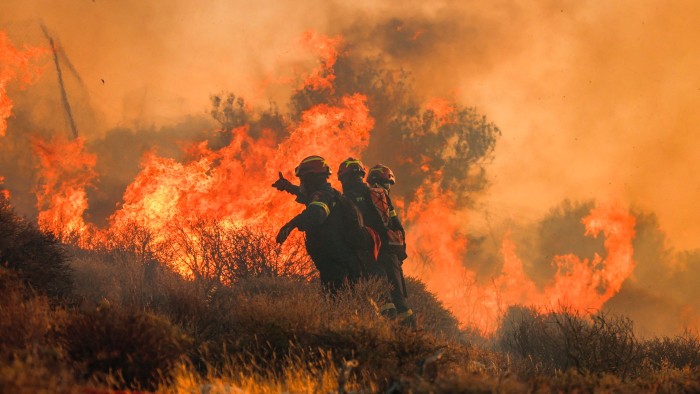A scorching heatwave across parts of Europe this week has been linked to half a dozen deaths, fuelled wildfires in Greece and Turkey and piled pressure on the continent’s already stressed waterways.
More than 1,500 people were evacuated as fire fighters battled to control fires on the Greek island of Crete on Thursday, while two farmers died after becoming trapped by flames in Spain’s Catalonia region earlier in the week. In Turkey, more than 50,000 people facing wildfires were evacuated in the western province of Izmir.
Temperatures have soared above 40C in some areas this week — reaching as high as 46C in Spain and Portugal — as Europe struggles with back-to-back heatwaves.
Samantha Burgess, strategic lead for Climate at European Centre for Medium-Range Weather Forecasts, said the June-July heatwave had exposed “millions of Europeans to high heat stress”, noting that many across the continent had experienced “very high temperatures” since the start of June.
“Climate change is making heatwaves more frequent, more intense, and impacting larger geographical areas,” she said.
The highs seen in June were more typical of July and August weather, Burgess said. Spain and England reported its hottest June on record, while it ranked as the second-hottest for France. Mainland Portugal experienced a record daily temperature for June of 46.6C.
Michalis Diakakis, an expert on climate-related disasters at the University of Athens, said Greece and the south-east Mediterranean were experiencing “extreme heat and drought conditions”.
This prolonged heat, followed by strong winds, had created the “perfect conditions” for wildfires such as those in Crete and Turkey, he added.
The fire in Crete broke out on Wednesday afternoon near the municipality of Ierapetra, with flames spreading quickly fuelled by strong winds and dry conditions.
“In Crete specifically, very strong north winds combined with the island’s rugged topography, allow for limited accessibility for firefighting teams,” Diakakis said.
The “dramatic terrain”, particularly its steep gorges, “can drive fires to behave explosively”, making “containment exceptionally challenging”, he added.
France and Switzerland were both forced to either suspend or reduce activity at some nuclear power plants this week as temperatures rose.
Most inland nuclear plants rely on rivers to cool reactors and spent fuel, heating the water in the process before discharging it back into the waterways.
But with river flows low and temperatures already high, Paul Dorfman, chair of the Nuclear Consulting Group, said discharging the heated water “back into the river risks significant damage to the receiving river ecology, killing off plant and animal life in the process”.
“This is the key reason why some reactors have been closed or powered down during the heatwave,” he added.

River flows across many European rivers, including the Rhine, Elbe and Seine, are predicted to be low over the summer months, on the back of a dry spring and continued warm weather.
S&P Global Ratings warned in a recent report that southern Europe was one of the most water-stressed regions in the world, saying that urgent investment in infrastructure was needed in Spain and Italy in particular.

The surface water temperature of the Mediterranean Sea had been exceptionally hot, reaching near records, said Kostas Lagouvardos, a research director at the National Observatory of Athens, although strong northerly winds in the Aegean Sea had helped keep sea temperatures lower around parts of Greece.
Lagouvardos added: “Due to climate change, heatwaves are increasingly affecting areas of Europe that usually enjoy milder weather conditions during the summer.”
At the Global Tipping Points Conference and Exeter Climate Forum in the UK this week, involving hundreds of delegates from leading European scientific organisations and academia, almost 200 participants endorsed a statement calling for action from policymakers “especially leaders meeting at the COP30 climate summit in Brazil later this year”.
The experts said rising expectations that global warming since pre-industrial times would exceed 1.5C “within a few years” as greenhouse gas emissions kept rising meant that billions of people were at risk from climate tipping points, or the level at which it irreversible changes to the Earth’s systems are anticipated.
Ruth Engel, a data scientist for extreme heat and environmental health at the WRI Ross Center for Sustainable Cities, said Europe needed to prepare for warmer temperatures, adding that extreme heat was “deadly in its own right”, as well as worsening wildfire risk, air pollution and the spread of certain diseases.
A “real challenge is protecting people where they actually feel the heat — in their homes, workplaces, and public spaces”, she said.
Climate Capital

Where climate change meets business, markets and politics. Explore the FT’s coverage here.
Are you curious about the FT’s environmental sustainability commitments? Find out more about our science-based targets here




